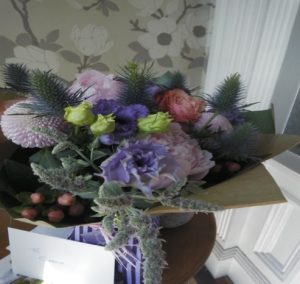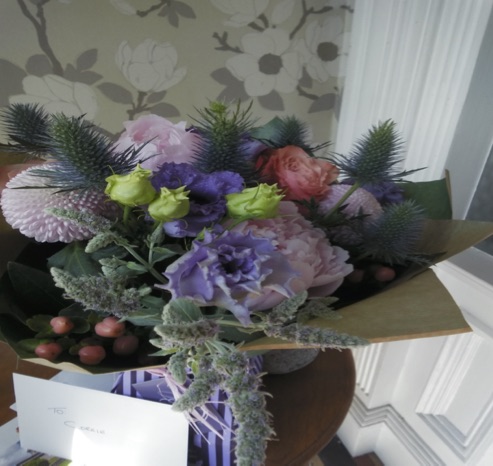Environment Challenge Winner
And the winner is….
Janice Wilson, SI Crieff, Programme Action Officer set a challenge to members of SI Crieff and their friendship link clubs to write something about our Environment or Climate Change. It was called “Climate Conversations”.
The winner was Corrie McNeill of SI Crieff who has received a bunch of flowers for taking the time to write. The Runner up, Esther Roberts, comes from our Friendship Link in Rhyl, who receives a small cheque for a charity.
Here are the winning entries:
CLIMATE CHANGE AND THE ENVIRONMENT
Corrie McNeil
SI Crieff
Over the four and a half billion years since the creation of the beautiful little planet we call ‘Earth’ there have been many climate changes: five ice ages each lasting for hundreds of thousands of years interspersed with warmer periods, the last ice age being around 10,000 years ago. These changes were probably caused by shifts in the Earth’s axis in relation to the sun or its orbit round the sun so, climate changes are nothing new for our earth.
However, In the last few years, Climate Change, Global Warming and the Environment have become buzz words – on everyone’s lips and governments’ agendas because mankind has realised that, this time, Climate Change is being caused by human activity, This time the buck stops with us. We made the problem, only we can find the solution.
The seeds of the problem lie in the -19th century with the Industrial Revolution when coal began to be mined to provide power to operate rail roads, machinery, land was cleared and agricultural methods changed. The use of fossil fuels such as coal, oil and gas, which has been buried for thousands of years releases carbon dioxide into the atmosphere. Nitrous oxide used in fertilisers is 300 times more potent than carbon dioxide. Deforestation means there is more carbon dioxide in the atmosphere as there are fewer trees to absorb it. Now there are more petrol-driven cars and thousands of flights a day – (well there were until the Covid pandemic!) During the 20th and 21st centuries the level of CO2 in the atmosphere has risen by 40%.
Now is certainly the time for action on the part of world governments. To ensure the temperature of the atmosphere stays below 1.5 degrees Centigrade the volume of Carbon Dioxide and all the other greenhouse gases which are causing global warming must be reduced rapidly and dramatically. Although it will be mainly the responsibility of world leaders to ensure this happens, we can all play our part, small though it may sometimes seem, by supporting initiatives and keeping up the pressure on those in power.
The Environment is also much talked about and although it is affected by global warming, it is not quite the same problem. The word ‘environment’ is derived from the French ‘environs’ meaning ‘surroundings’. The environment of a city is very different from that of a country village although they may be as little as 30 miles apart. We have to deal with our OWN environment i.e. where we live. Off course we can, and should, express our views, support ideas and action plans put forward by groups, organisations and governments and let our opinions be known, but actions which will address the serious issue of the change in our climate brought about by humanity do need bigger efforts and agreements among world leaders..
We can focus our attention on taking steps to improve our own environment, the places where we live. Where do we start for there is so much we can do! Soil, plants, trees, flowers, habitats for the wild creatures, water, springs, burns, streams, rivers, lochs, our normal surroundings – local walks, parks, and streets. The health of all of these affects all of us as well as the insects, birds, fish, and all of the wildlife that co-inhabit our environment but which we rarely see.
Let’s take soil and all we use it for. We can improve the soil in our garden by making a compost area and add so many items we might otherwise throw away, such as tea leaves/ bags, coffee grounds, leftover scraps, paper, autumn leaves.
We can attract bees and other insects, butterflies, ladybirds by planting appropriate trees, bushes, flowers. Think of a Buddlea bush in full bloom with almost every flower covered by butterflies or a Sedum in autumn, a positive bee-fest buzzing from flower to flower, but butterflies and bees are far less often seen now than 50 years ago. Modern agriculture and the use of huge mechanical farm equipment has meant bigger fields, fewer hedgerows and fewer places for birds to nest. Larks are not often heard now and the distinctive cry of the pee-wits is also rare. So many creatures have been lost or have become endangered over the past 50 years in our land and so many more across the globe.
We can plant vegetables and fruit, so we don’t need to buy green beans from Guyana and mangetout from Morocco thereby cutting out the Co2 output from planes carrying these products to our airports then by road to the wholesalers/depots before they finally arrive, no doubt plastic wrapped, at our local shop.
We can grow shrubs and flowers which attract masses of honey bees and butterflies, and myriad creepy crawlies which are all a part of the wonderful jigsaw of nature each one depending on the other.
We have to look after our streams and rivers, taking care that we don’t add anything to them which will find its way into the lochs and eventually the sea and keeping our eye on them to ensure that no litter is allowed to lie and rot and eventually pollute them. When we go for a walk we could take a bag into which litter can be put and disposed of safely. We should feel a sense of ownership of our own area – if we wouldn’t allow it in our back garden, let’s not allow it anywhere!
Let’s make Comrie and Crieff shining examples of what environments can be and let’s not forget the education of children to ensure we pass on to them the realisation of what a precious place is Earth, our home. We have the unique opportunity to save our planet but
WE MUST ACT NOW

Why is it necessary to save our Environment
Esther Roberts SI Rhyl & District
Humankind has always been an integral part of the world’s environment, sharing it with a wealth of species, plants and other animals. It has nurtured us as we have evolved and for most of the time the footprint we have left has been scarcely visible. However in the last two centuries, through our ignorance and greed, we have been responsible for the degradation of the environment with the destruction of habitats and the species which rely on them. Through the demands on natural resources and excessive consumption in developed economies we have been responsible for global warming, while the disparity in the worldwide distribution of incomes is an affront to human dignity. Unless we rediscover respect for our environment and appreciate that it is there to sustain all of humankind, we face years and years of conflict over diminishing resources of water, food and clean air.
The rediscovery of respect for our environment will be a challenge but unless we rise to it the survival of humankind is in peril. For the developed world, it will involve consuming radically less of the world’s resources and changes in lifestyle which result in less pollution and the restoration of habitats and the species which live in them. For the individual there will have to be less polluting forms of travel especially flying, less polluting ways of heating our homes, changes in diet, consuming less meat and fish and the repair and re-use of our possessions rather than throwing them away. As consumption is moderated in the developed world, it will need to be accelerated in the developing world to provide improved standards of living and thereby stabilising migration from those areas. But here too changes in lifestyle and customs will be desirable, particularly to enhance the status of women thereby realising the full potential of those societies as a whole.
All of this will require leadership throughout society at every level. Soroptimists can play a part in raising awareness and understanding of the challenges to be faced and the resolutions which will be needed to tackle them. We must act in the spirit of the Welsh saying ‘A fo ben, bid bont’. ‘To lead is to be a bridge’.
Esther Roberts SI Rhyl & District
Runner up in Essay Competition.
Esther Roberts from Crieff’s Friendship Link Club – S I Rhyl & district.


